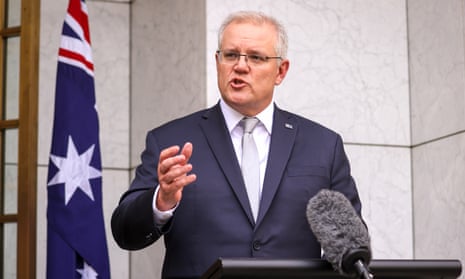Scott Morrison’s pandemic pledge to return Australians stranded overseas by Christmas 2020 caught officials off-guard, with an audit revealing the then prime minister announced the plan before it was discussed within government.
A new report by the Australian National Audit Office paints a picture of how the Department of Foreign Affairs and Trade attempted to respond to the rapidly unfolding pandemic crisis, but finds major gaps in its record-keeping.
These gaps included failing to keep proper records of Australians deemed to be particularly vulnerable and why they sometimes rejected flight offers, undermining the quality of advice that could flow to government during the border closures.
The report tabled in parliament on Tuesday examined Morrison’s comment on 18 September 2020 that he “would hope that we can get as many people home, if not all of them, by Christmas”.
The report said that on the same day, Morrison ordered the creation of an interagency taskforce to support the return of Australians before Christmas.
But one of the footnotes in the ANAO report reveals: “Dfat advised the ANAO that before the government’s announcement, the return of Australians by this date had not been discussed with the government.”
On 23 October 2020, Morrison characterised his earlier comment as “our commitment”, and said it applied to the 26,200 Australians – including 4,100 classed as vulnerable – at the time the pledge was made. That meant others applying after that date were not considered covered.
Five days later, the then foreign affairs minister, Marise Payne, described it as a “goal”.
After Morrison spoke publicly about the Christmas timeframe, the report said, Dfat put forward an implementation plan in October 2020 that proposed re-introducing government-contracted flights, which had not operated since June.
The department responded to the audit by acknowledging “the circumstances of the pandemic were extraordinary and there are lessons to learn”.
But the department suggested that the ANAO had focused “narrowly” on the period between Morrison’s comment in September 2020 and Christmas 2020, when considering whether the government’s objectives were met.
“At that time, 26,200 Australians had registered as seeking to return; by Christmas, more than 24,800 had returned,” the Dfat response said.
During this period, Morrison and his ministers had repeatedly stated that the number of Australians seeking to return home was not static, noting that more people kept adding themselves to the list.
Dfat said in its response, also tabled on Tuesday, that it had been able to assist a total of 61,755 Australians to return from overseas and to arrange 227 facilitated flights throughout the course of the pandemic.
“The scale and complexity of the pandemic was unprecedented,” the department said, adding that it had mobilised “its largest ever consular response”.
It said it had to respond to evolving international border settings, state and territory managed quarantine and incoming passenger caps – many factors of which “worked against Dfat’s effort to return Australians”.
The ANAO’s long-running review of Dfat’s Covid-19 response found the department’s preparedness to manage complex crises before the onset of the pandemic was only “partly effective”.
The report said the pandemic had “highlighted weaknesses in responding to standard and complex, and large-scale crises” and called for improved structures “to ensure it is prepared to respond to future major and complex crises”.
It said Dfat “did not maintain sufficient records of procurement arrangements” for dozens of contracted flights.
Auditors were not able to find any formal record of the government approving the second evacuation flight from Wuhan in early 2020, except for a WhatsApp screenshot.
The report found Dfat was largely effective in engaging with overseas Australians, providing timely and relevant information to Australians about issues such as travel risks and means of returning to Australia.
But it did not have appropriate systems to respond to complaints.
Dfat set up a Covid-19 crisis citizen information database in April 2020, including fields to record contact with registered Australians, such as ‘date of last contact’ and ‘date of last attempted contact’.
But the ANAO report said the department “did not maintain data on its contacts with registrants or attempts to contact registrants in 99% of cases”.
Dfat only started “documenting phone calls and emails sent and received in relation to flights assistance in a spreadsheet in April 2021”.
The report also found there was “significant variation” in the proportion of passengers booked on government-contracted flights identified as vulnerable, ranging from 2% to 88%.
It also reveals that Dfat advised the government in March 2020 “that it would not be possible to assist all Australians to return to Australia, and that some would not take up an option to return when available”.
Dfat accepted seven of the ANAO’s nine recommendations, saying many of the suggestions were already being addressed.
